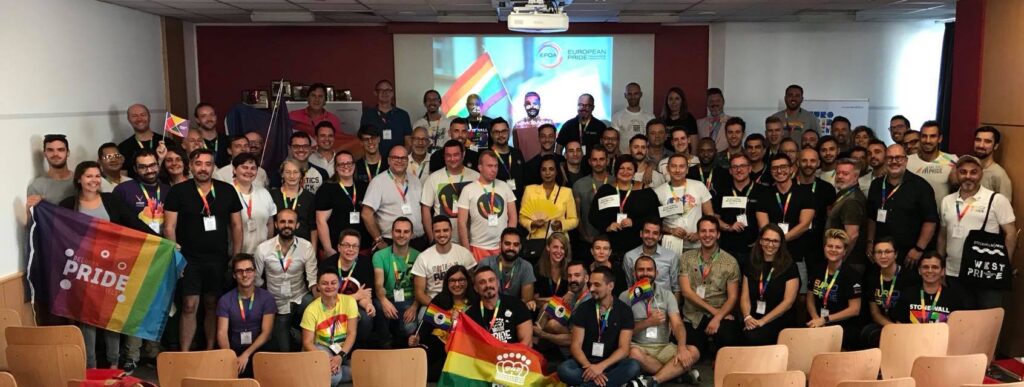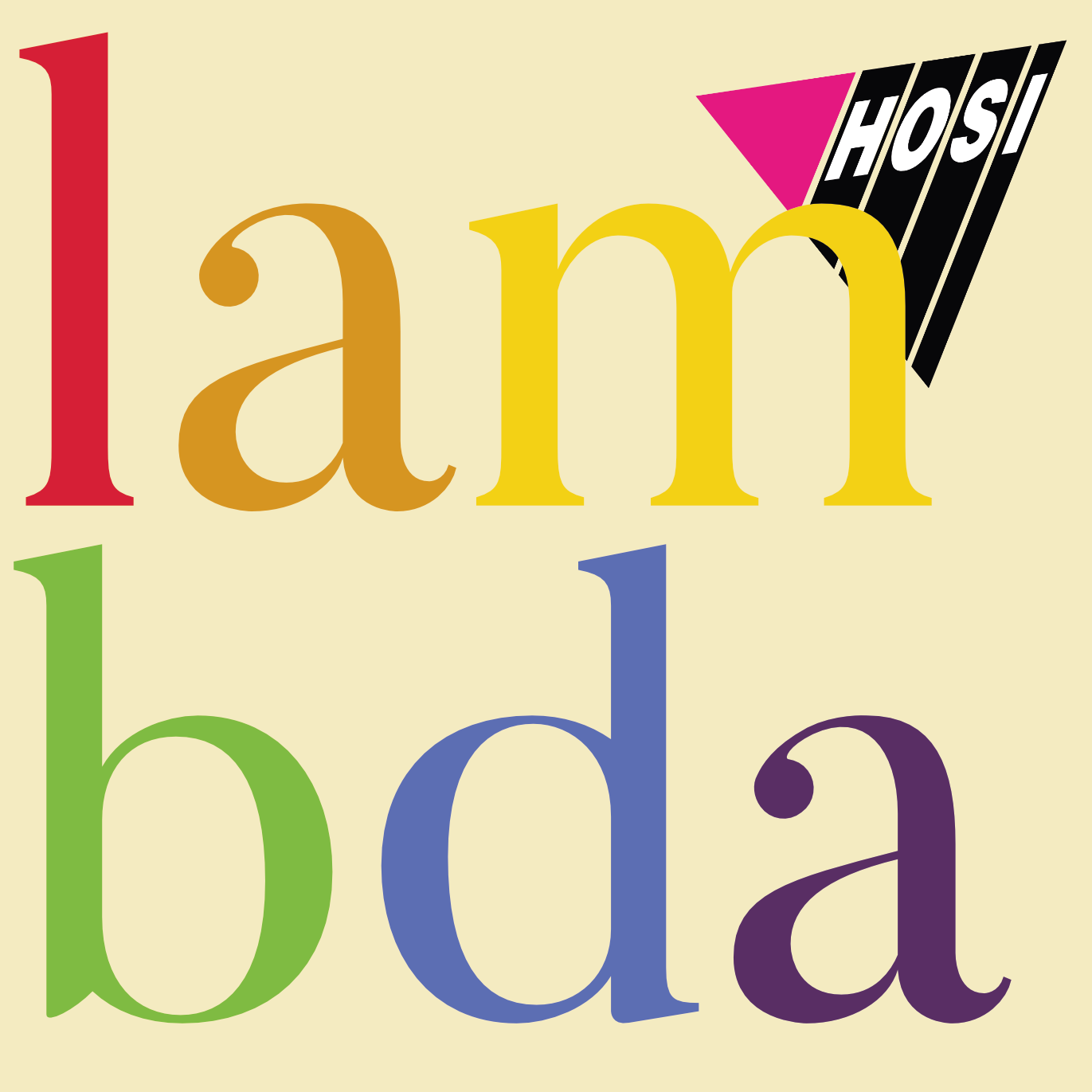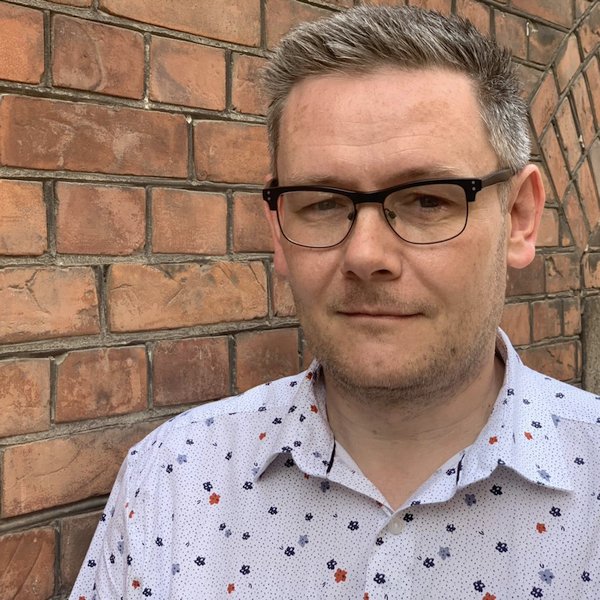Interview mit Steve Taylor, Teamleiter bei WorldPride und EuroGames Kopenhagen / Malmö 2021 und Vorstandsmitglied European Pride Organisers Association (EPOA)
Jährlich wird eine europäische Pride zur EuroPride – es sein denn, die zweijährlich stattfindende WorldPride kommt nach Europa, wie z.B dieses Jahr nach Kopenhagen und Malmö. Die Lizenz für die EuroPride wird seit 1992 von der European Pride Organisers Association (EPOA) vergeben, für 2019 an die HOSI Wien, die mit Kurt Krickler (ehem.) und Katharina Kacerovsky-Strobl (seit 2019) bereits zwei Vorstandsmitglieder in die EPOA entsenden durfte.
Die EPOA ist aber mehr als Verleiherin eines Titels: Als europaweites LGBTIQ*-Netzwerk spricht sie vor dem Europäischen Parlament und zeigt Solidarität, indem sie vor allem dort unterstützt, wo es schwer ist, Pride ins Leben zu rufen: Im ländlichen Raum und auch in Staaten, in denen Politik und Gesellschaft nicht unterstützend, sondern repressiv handeln – wo es also noch wichtiger ist, für LGBTIQ*-Rechte auf die Straße zu gehen. Aber auch die HOSI Wien und andere, große Pride-Organisierende profitieren sehr vom Erfahrungsaustausch.
Steve Taylor, Vorstandsmitglied der EPOA und ehem. der „Pride in London“, hat ein UK-weites Pride-Netzwerk mitbegründet und ist nun im Leadership Team von „Happy Copenhagen“, das derzeit gemeinsam mit Malmö Pride die WorldPride und EuroGames 2021 plant – und das in dieser Zeit, in der Planung beinahe unmöglich scheint. Sein Fachgebiet, in dem er seit vielen Jahren auch hauptberuflich tätig ist, sind Medien und Kommunikation, wofür er bei all diesen Organisationen auch zuständig ist/war. Das Interview fand in englischer Sprache statt und soll hier im Original wiedergegeben werden.

What motivated you to work that much for an umbrella organisation such as EPOA besides your daily full-time job and volunteering at pride organisations?
Idiocy … (laughs) … No … I’ve always thought that volunteer organisations are much stronger and have more power when they work together. And the vast majority of Pride organisations are entirely run by volunteers. Even when you just share ideas and problems, you can find out how someone else just doubts the problem. You can also share resources, share equipment: I know that through pride networks that they have lent each other megaphones and high-vis jackets and all that kind of stuff you need to run an event. That kind of cooperation, I think, is really important.
I think EPOA has the potential of being much stronger in that way and so I was quite excited to join, observe, help and see how I can be part of it.
What were the most important benefits the European LGBTIQ* community inures of EPOA in the past / is inuring now / do you want them to inure in the future?
I think the most important benefits in the past have been the way that EPOA has enabled small grass-root organisations to get Pride off the ground, because it can provide that networking, it can provide the link to other organisations and to other people who didn’t do the same thing in the past and I think increasingly, certainly over the last 5 years, EPOA has had a much stronger role in advocacy – not just for the pride movement but for LGBTIQ* issues generally. Because now that EPOA has virtually all the capital city prides as a member, as well as many, many smaller prides, it’s a power block, it’s a powerful voice. So, when we talk to the European Parliament or the Council of Europe or even just national governments, when we talk to the government in Poland as much as they don’t like what we say, they can’t just dismiss it because there is power in the movement that we represent.
And I think in the future, EPOA will have an even stronger role because the rollback of LGBTIQ* rights in (South-)Eastern Europe and some parts of Central Europe, that kind of voice, will be more necessary.
Because Copenhagen is smaller, do you think it’s more present and less in danger of foundering as it could in a megacity with more than 10 million inhabitants?
I think in London, if you are away from Westend/Zone 1, you could potentially miss the fact that Pride is going on. There are posters in every London Underground station and there’s lots of commercial activity, but decorating the city only focusses on the very centre.
Because Copenhagen and especially its city centre is a lot smaller and a lot of events are taking place outside the city centre (e.g., all the EuroGame events), you will see a lot more rainbows across a greater area in Copenhagen. And still, it will be the biggest ever LGBTIQ* event in Scandinavia. There’s lots of news coverage lined up and the main morning TV programme will be broadcasting it every morning. It’s really well integrated into the media landscape. So, I think it will be quite difficult to miss in Copenhagen but easier to miss in London.
In 2020, we experienced the first digital pride. What are the most important qualities this kind of pride can exclusively offer?
The thing with Global Pride 2020 and any digital pride is: because it’s entirely online, anybody can take part. Whether you are in Berlin or out with your family, you can still watch it. You can still feel like you’re taking part. If you live in Uganda or Saudi Arabia, you could still engage in it in a much better way than ever before. I think entirely digital events can never replace being there on the streets, but it would be a mistake if we rolled back to where we were before the pandemic and never did digital events. So, they are really important alongside the “being there” events because they allow us to even reach people who are disabled, who don’t like crowds and so on.
In 2021, you are planning WorldPride for an unplannable time. What are the biggest challenges and what can we learn for the future from this?
Obviously the biggest challenge for us has been uncertainty: We couldn’t postpone WorldPride until next year, because if we did, it would only have been six months to the WorldPride event in Sydney and that would have been unfair on them. Also, we’ll be having EuroGames and EuroPride next year. If we cancelled, it would have bankrupted the Copenhagen Pride because we would have had to pay back millions of euros on sponsorship, and that money has been spent – events like these are expensive. We have also not been able to make firm plans because we had to wait for the government and what their decision would be as to reopening in August. They made the decision at the beginning of May, and we were able to announce the changes on 17th May and that’s only three months away from the event.
From the start of the pandemic until now, we have been planning three events: the full event, in case there is no more pandemic, a scalable event that might have been smaller, where we can change or cancel some parts, and also an entirely digital event. So, every bit of planning we did, had to be for all three events. Only after the government’s decision were we confident about the second (scalable) event. So, we had a lot more planning work, more than we would have asked for.
Three months before EuroPride Vienna 2019, you had pretty firm plans and you could tell people what was going on, e.g., this is when Regenbogenparade is going to happen, these are the artists performing and these are the bars that will be open. Three months before WorldPride, we are now looking for venues to include bars because we had to wait for the government approvals for so long. We also need a big park with a big screen where you can watch the concerts because their venue is so small, and we haven’t even confirmed this.
What does this mean for the queer gastronomy sector in Copenhagen and Malmö?
Most of them have been closed for a year now, of course. From our perspective, it should have been a fundraising opportunity, but because of the pandemic, they are struggling to survive. So, I think they will be super busy, they’ll be making lots of money, but we couldn’t ask them for money because it’s not there.
What about the artist performances? Will there also be an opportunity for local queer artists to present something?
We are talking to major artists about performing, people you have heard of. Getting them here, especially from the US, is quite difficult. But also, most of them haven’t done any kind of work they usually do for a year now, so they are really excited to get an invitation. We just have to hope that the situation will allow this to happen.
On Friday night, local queer artists will be performing. And all in all, the stage programme will include 95 % queer artists.
Because the possibility of having some rave will be less, do you think Pride will be going back to its roots? What does this mean for the Pride’s intentions, politically and as to human rights, to balance the goals of maximum visibility and loudness and also to bring across the Queer Human Rights message?
Lots of prides will be going back to a more political message, to demonstrating, partly because of the impacts of the pandemic, but also partly for practical reasons because in most cities, the authorities can stop you from doing a parade, because it’s a performance, it’s a spectacle, but they can’t stop you from staging a Human Rights demonstration which is within guidelines.
Some people will really like the fact that there won’t be these big corporate participants, but I think what we have to recognise is the fact that if we don’t have them taking part, one of the biggest impacts would be that we won’t be having the money to keep Pride free for the majority of people taking part. This is why we shouldn’t throw out the idea of having corporates because I think businesses taking part is a good thing. It allows them to say to their employees globally, “This is what we believe in!”, even in countries where we can’t have Pride. This is really important. So, I don’t want us to lose that next year or whenever.
If Pride doesn’t go back to its roots but to where it was on the eve of the pandemic, what other options does the queer political movement have to be more visible?
Pride is still a political demonstration and it’s absolutely reliant on the activists who want to use it as a political demonstration to just make sure that they are as loud, as visible and as prominent as they can be. Because their message is just as important as the one of every other activist group.
The fact is, they have to make sure that their message is clear, that they’ve got enough people to communicate it and make that part of the parade their own. In this way, people notice what they’re saying, take photos and post them on the internet. Therefore, people see it and think, “what’s that all about?”. And then they learn, for example, that PrEP is not available for free in many countries, and also all the different things people want to campaign about.
I’d love to see more political statements at Pride, but the community has to be relied upon to do this. Regenbogenparade is only a platform that makes sure that the streets are closed, that the police know about it and that HOSI Wien has received permission to do it. But what happens at Regenbogenparade itself is up to the community, it’s their event. If community groups think there’s not enough politics in the parade, as far as I’m concerned, that’s their fault. I’d tell them this: “You should have made sure that you were there because it’s there for you. If you’re not there, someone else will be. So get in there and make your point!”

